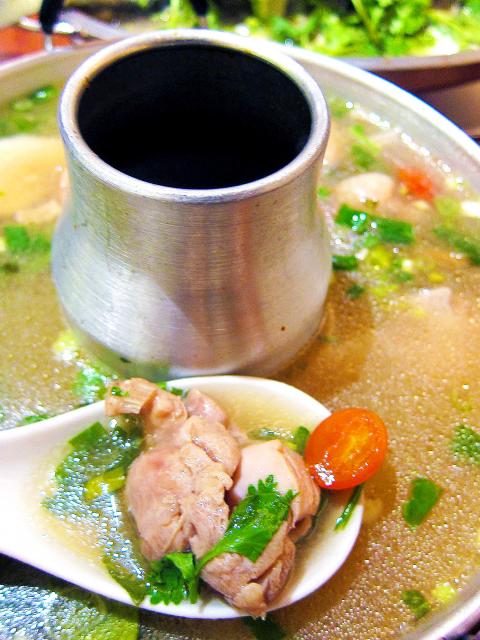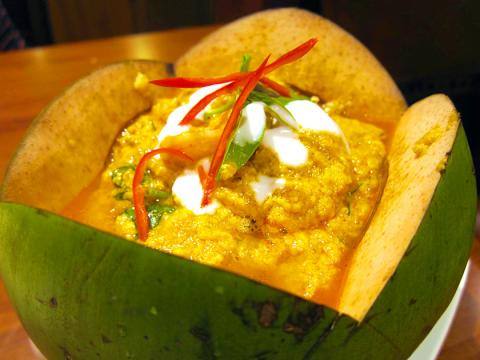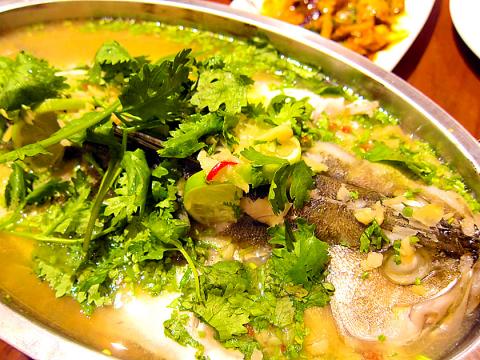Thai Made (泰美) on Dongfeng Street (東豐街) is a welcome recent addition to Taipei’s Thai food scene, serving cuisine from northern Thailand. Dishes are flavored with plenty of chili, lemongrass, tamarind juice, ginger and spices. Coconut milk-based dishes, on the other hand, are not as predominantly featured on the menu as at other Thai restaurants that serve dishes from central or southern Thailand (though there are still several coconut milk curries on the menu).
The restaurant’s interior is simple but thoughtfully appointed, with large black-and-white portraits of Thai people in traditional dress lining one wall and baskets of produce, herbs and spices carefully arranged in front of wide windows that look into Thai Made’s open kitchen. A back room is available for larger parties, while the patio is a great spot for lunch on sunny days.
Thai Made’s lengthy, tri-lingual menu (Thai, Chinese and English) is daunting to look through at first, but the restaurant’s recommendations are delineated with small yellow dots — and servers are quick with recommendations. These include the excellent “traditional northern Thai original raw fish salad”(NT$280), which the restaurant prepares in limited quantities every day. It is made from a finely minced mixture of raw fish flavored with green onions, garlic, chili and spices until eye-wateringly piquant. The salad is served with a pile of crisp cabbage leaves to scoop the fish onto.

Photo: Catherine Shu, Taipei Times
Most dishes on Thai Made’s menu feature a similarly thoughtfully and finely calibrated balance of flavors and textures. The eggplant wok-fried with sweet basil (NT$220) had just as much chicken, crisp onions, cherry tomatoes and green peppers as it did eggplant and basil, taking it a notch above an ordinary side dish.
Both the raw fish salad and eggplant featured rich flavors and very spicy chili peppers, while the steamed sea bass with lime, garlic and chili (NT$400), another one of the restaurant’s signature dishes, came as a welcome mellow break for our taste buds. The fish, served whole, was cooked until its flesh was buttery and had picked up the flavors of the aromatic broth. Along with the raw fish salad, the steamed sea bass was one of our favorite dishes of the night.
Northern style chicken in galangal soup (NT$300) was another refreshing dish ideal for a summer night. It featured chunks of boneless white chicken meat simmered until tender in a broth with lots of lemongrass, galangal (a root vegetable related to ginger), cilantro, cherry tomatoes and red chili peppers.

Photo: Catherine Shu, Taipei Times
The only dish that fell beneath my expectations was the seafood red curry cream soup served in a whole coconut (NT$400). The presentation is cute and the large servings of fresh seafood in the curry, including prawns and crabmeat, were excellent, but the red curry tasted slightly too sweet and bland, especially when compared to the zestier and more complex flavor combinations of our earlier dishes.
Thai Made’s service is excellent, so if you feel overwhelmed by the restaurant’s menu, ask your waiter or waitress to recommend dishes for you. The spiciness of most dishes can be adjusted, but Thai Made’s definition of “a little spicy” is actually very piquant.

Photo: Catherine Shu, Taipei Times

The Taipei Times last week reported that the rising share of seniors in the population is reshaping the nation’s housing markets. According to data from the Ministry of the Interior, about 850,000 residences were occupied by elderly people in the first quarter, including 655,000 that housed only one resident. H&B Realty chief researcher Jessica Hsu (徐佳馨), quoted in the article, said that there is rising demand for elderly-friendly housing, including units with elevators, barrier-free layouts and proximity to healthcare services. Hsu and others cited in the article highlighted the changing family residential dynamics, as children no longer live with parents,

Oct 20 to Oct 26 After a day of fighting, the Japanese Army’s Second Division was resting when a curious delegation of two Scotsmen and 19 Taiwanese approached their camp. It was Oct. 20, 1895, and the troops had reached Taiye Village (太爺庄) in today’s Hunei District (湖內), Kaohsiung, just 10km away from their final target of Tainan. Led by Presbyterian missionaries Thomas Barclay and Duncan Ferguson, the group informed the Japanese that resistance leader Liu Yung-fu (劉永福) had fled to China the previous night, leaving his Black Flag Army fighters behind and the city in chaos. On behalf of the

I was 10 when I read an article in the local paper about the Air Guitar World Championships, which take place every year in my home town of Oulu, Finland. My parents had helped out at the very first contest back in 1996 — my mum gave out fliers, my dad sorted the music. Since then, national championships have been held all across the world, with the winners assembling in Oulu every summer. At the time, I asked my parents if I could compete. At first they were hesitant; the event was in a bar, and there would be a lot

Smart speakers are a great parenting crutch, whether it be for setting a timer (kids seem to be weirdly obedient to them) or asking Alexa for homework help when the kids put you on the spot. But reader Katie Matthews has hacked the parenting matrix. “I used to have to nag repeatedly to get the kids out of the house,” she says. “Now our Google speaker announces a five-minute warning before we need to leave. They know they have to do their last bits of faffing when they hear that warning. Then the speaker announces, ‘Shoes on, let’s go!’ when